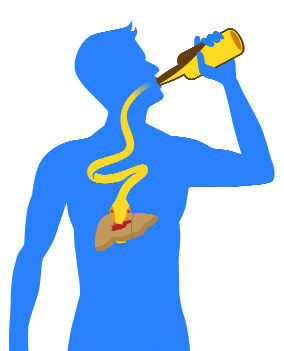
Tribune News Service
Chandigarh, May 14
In what could be a major breakthrough in treating liver-related ailments, the Institute of Microbial Technology (IMTECH), Chandigarh, today announced a collaboration with the Institute of Liver and Biliary Sciences (ILBS), New Delhi, for developing alternative microbial approaches to the currently used treatments for patients affected with severe alcoholic hepatitis (SAH).
At present, the ILBS is using a novel faecal microbiota transplant (FMT) therapy in SAH patients wherein the poop of healthy donors is processed and administered to a patient having alcoholic hepatitis caused due to excessive intake of alcohol. The ILBS is a premier institute and hospital for advanced and specialised healthcare in liver and biliary disorders and has a stool bank for FMT.
Under a memorandum of understanding signed today, the ILBS and IMTECH will collaborate for “microbiome research” and perform clinical trials on patients affected with the SAH, a statement issued here said.
The aim is to explore the possibility of formulating minimal microbial consortia from healthy human poop, which can be administered easily for treating the SAH and other liver-related ailments. It is well known that poop carries a good representation of bacteria in the human gut that are helpful in maintaining a healthy gut and health.
The first interaction of the IMTECH and ILBS scientific task force was presided over by Dr Shekhar Mande, Director General, Council for Scientific and Industrial Research, Dr Shiv Sarin, Director, ILBS, Dr Anil Koul, Director, IMTECH, and other scientists from both institutes.
At present, patients having severe alcoholic liver disease are often treated with steroids, which have major side-effects on the immunity of the patient and can result in unwarranted infections with only a 50 per cent success rate. The other option is a liver transplant, which is often not feasible due to lack of donors and the expenses involved.
With the FMT, the entire procedure for treating the patient could change as it just involves faecal transplant through nasal or rectal route. The initial results show that the method is efficient and can be a good and affordable alternative for SAH patients. However, the major challenge in the FMT procedure is identification of healthy poop donors and delivery through nasal or rectal route.
Once scientists identify the core gut microbial consortia present in human faecal samples that would have therapeutic potential towards severe alcoholic hepatitis, clinical trials would commence. Around 250-300 patients will be clinically monitored for testing the efficacy of the treatment procedure over a period of next 36 months. As per a WHO report released in 2018, 2.6 lakh Indians die every year due to liver damage such as chronic liver disease and cirrhosis that can be attributable to consumption of alcohol. The report highlighted that globally around 51.1 men and 27.1 women per 1,00,000 population suffered from liver cirrhosis and cancers associated with alcohol abuse.
- Under an MoU signed on Tuesday, the ILBS and IMTECH will collaborate for “microbiome research” and perform clinical trials on patients affected with the SAH.
- The aim of the tie-up is to explore the possibility of formulating minimal microbial consortia from healthy human poop, which can be administered easily for treating Severe Alcoholic Hepatitis and other liver-related ailments.
- It is well known that poop carries a good representation of bacteria in the human gut that are helpful in maintaining a healthy gut and health.
Drawbacks of current method
At present, patients having severe alcoholic liver disease are often treated with steroids, which have major side-effects on the immunity of the patient and can result in unwarranted infections with only a 50 per cent success rate. The other option is a liver transplant, which is often not feasible due to lack of donors and the expenses involved.



























